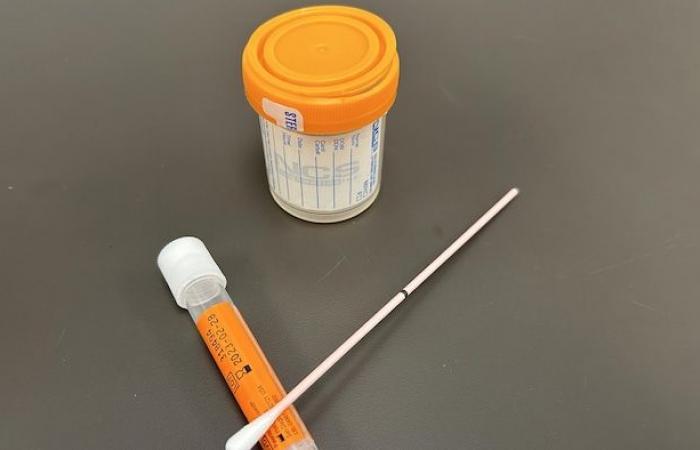Four pharmacies in the Halifax Regional Municipality are distributing self-tests for sexually transmitted infections (STIs) as part of a pilot project that aims to make testing more accessible. The researcher leading this study says he is surprised by the high rate of positive test results.
Around 50 people have obtained free self-tests since August from one of the four pharmacies which distribute them as part of the Swab-Rx clinical study.
Professor in the Department of Pharmacy at Dalhousie University, Kyle Wilbylaunched this pilot project with the aim of making the screening of ITS plus accessible.
He indicates that public demand for sexual health is growing in Nova Scotia. According to him, the services offered in the province are very good
but struggle to offer enough tests, treatments and prevention tools.
So we thought community pharmacies could be a great way to unclog clinics for ITS or sexual health centers
he explains.
Also read and listen:
People who wish to be tested for chlamydia or gonorrhea infections can make an appointment at one of the four pharmacies participating in the clinical study, either Boyd’s Pharmasave and SRx in Halifax, Brookline has Bedford and Moffatt at Dartmouth.
Since the study began, Kyle Wilby said he noticed that several people who came to the pharmacy did not have symptoms.
We thought we had a very low positivity rate, but we actually got a high positivity rate
he said.
The researcher emphasizes the importance of screening people carrying the infection and treating them to reduce transmission within the community.
Often you don’t know if you are infected or not and you can still pass the infection on to other people. It is therefore very important, whether you have symptoms or not, to get tested regularly and get treated if you have an infection.
he adds.
Even if more and more people are getting into the habit of getting tested, the professor is convinced that the transmission of ITS is on the rise in the province.
It appears that after the pandemic there was an increase in infections such as syphilis. I can say that the infection that we find most often is chlamydia, which is one of the ITS most common in Canada
specifies the researcher.
Open in full screen mode
Treponema pallidum is the bacteria responsible for syphilis, a sexually transmitted infection (STI).
Photo : Getty Images
Chlamydia can cause sequelae such as pelvic inflammatory disease, ectopic pregnancies, infertility, and chronic pelvic pain.
In January 2025, depending on the results obtained, Kyle Wilby would like to propose to the government to integrate these screening services into all pharmacies in Nova Scotia. He also wants to maintain free self-tests at the end of the pilot project.
A screening facile
Once the appointment is made, the patient can go to the pharmacy and speak with a pharmacist who will provide them with all the necessary information on how to take the test.
Open in full screen mode
A sexually transmitted infection testing kit on August 14, 2024 at the Sexual Health Center in Halifax, Nova Scotia.
Photo: - / Paul Légère
The patient then receives a call from the pharmacist if their test is positive and the latter will then prescribe the appropriate treatment.
Since the ITS may develop in the mouth, throat, rectum or vagina, the patient should collect secretions from each part of the body where he or she could be at risk.
According to the professor Wilbythe frequency of screening should be based on risk factors for sexually transmitted infections.
If you have sex with multiple partners, unprotected sex, or even sex outside of a monogamous relationship, we recommend getting tested every three to six months
he declares.
On the other hand, he recommends the test of HIV once a year for everyone.







